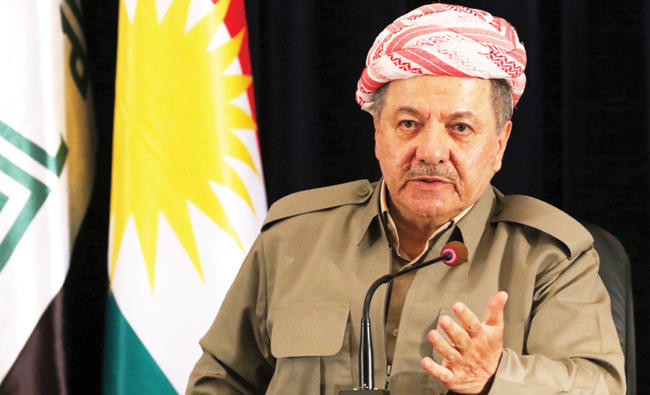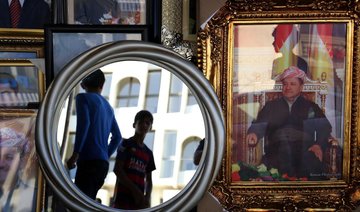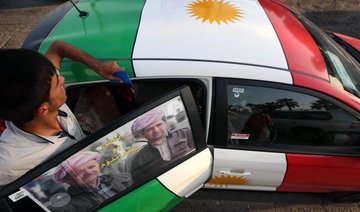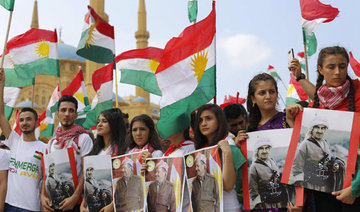BAGHDAD: After four decades with the Patriotic Union of Kurdistan (PUK), veteran politician Barham Salih announced the formation of a new party to participate in parliamentary elections in Iraqi Kurdistan, scheduled for Nov. 1.
“Today, crises weigh heavily on our people in Kurdistan, as a result of the dominance of a group of stakeholders over its capabilities,” said Salih, who served as prime minister of the Kurdistan Regional Government (KRG) from 2009 to 2012, and deputy prime minister of Iraq from 2005 to 2009.
His new party, the Alliance for Democracy and Justice, aims “to fight injustice, corruption and monopoly” in Iraqi Kurdistan, he added.
“In response to the suffering (of Kurds), division, monopoly, conflict, the language of defamation and accusations of treason, our coalition has emerged to achieve social and political harmony, and to address the problems and crises accumulated due to mismanagement.”
Iraqi Kurdistan has been autonomous since 1991. Its autonomy was strengthened after the 2003 US-led invasion of Iraq, with a regional government and separate security forces.
The most influential political parties in the region are the Kurdistan Democratic Party (KDP), headed by Masoud Barzani, and the PUK.
They have monopolized power in Iraqi Kurdistan since the 1990s, and have shared positions in the federal government for the last 14 years.
Salih was part of this system until he left Baghdad in 2012. The following year, he threatened to resign from the PUK in protest over the lack of transparency regarding party funds and decision-making mechanisms after its then-leader, Jalal Talabani, suffered a stroke.
A former Iraqi Kurdish ambassador and friend of Salih told Arab News on condition of anonymity that after the stroke, “the families (of Talabani and Barzani) took control of the leadership of the region.”
Salih “was Talabani’s stepson, but he wasn’t a family member, so he was excluded by the family,” the former envoy said.
“Also, he wasn’t a Peshmerga (fighter), so none of the PUK’s old political leaders backed his nomination for any regional or federal post.”
Salih — founder of the American University of Iraq-Sulaimaniya, and chairman of its board of trustees — has built a popular base among youths and intellectuals.
Repoar Kareem, a member of the Alliance for Democracy and Justice, told Arab News that most of its members “are young academics, experts, engineers, physicians and professors.”
He added: “We focused on those who have vision and ideas, and who can come up with solutions for Iraq’s major problems.”
No prominent political figures have been mentioned as party members. “If some senior leaders of the PUK and Gorran (the third-biggest party in Iraqi Kurdistan) defected to join Salih, he may get a role” in the KRG or the federal government, Abdullah Al-Zaidi, a leader of Iraq’s Shiite National Alliance, told the Arab News.
Salih spent a long time in the US, having been assigned to run the PUK’s office there in 1992, so many Iraqi politicians see him as America’s man in the region and in the PUK.
He “used to represent US interests in the PUK, in the face of most of the leaders of the party, who represented Iranian interests,” Iraqi political analyst Abdulwahid Tuam told Arab News.
“Since he left the PUK and hasn’t enjoyed the support of Iran, his chances of getting a senior post in Baghdad has significantly decreased.”
But Talabani’s death on Monday could lead to a succession challenge and subsequent divisions within the PUK. This could strengthen Salih’s position and bring more recruits to his new party.
“He’ll get seats in the Kurdish Parliament, but how this would impact the internal situation will depend on the names that join him,” said the former Kurdish ambassador.
“The situation in Baghdad is different. He may eye the presidency, but it’s almost impossible without the backing of the real players in Baghdad.”
Veteran Iraqi Kurdish politician announces new party
Veteran Iraqi Kurdish politician announces new party
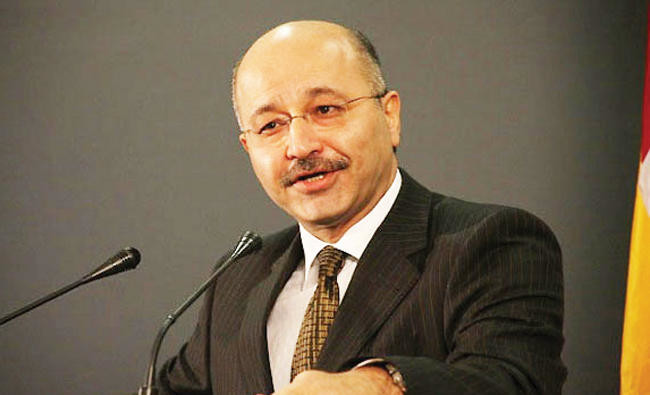
Israeli military says commandos raided missile plant in Syria in September

JERUSALEM: Israel’s military said on Thursday its special forces raided an underground missile production site in Syria in September that it said was primed to produce hundreds of precision missiles for use against Israel by the Iranian-backed Hezbollah.
The complex near Masyaf, in Hama province close to the Mediterranean coast, was “the flagship of Iranian manufacturing efforts in our region,” Israeli military spokesperson, Lt. Col. Nadav Shoshani told a briefing with reporters.
“This facility was designed to manufacture hundreds of strategic missiles per year from start to finish, for Hezbollah to use in their aerial attacks on Israel,” he said.
He said the plant, dug into the side of a mountain, had been under observation by Israeli intelligence since construction work began in 2017 and was on the point of being able to manufacture precision-guided long-range missiles, some of them with a range of up to 300 km (190 miles).
“This ability was becoming active, so we’re talking about an immediate threat,” he said.
Details of the Sept. 8 raid have been reported in the Israeli media in recent days but Shoshani said this was the first confirmation by the military, which usually does not comment on special forces operations of this type.
At the time, Syrian state media said at least 16 people were killed in Israeli airstrikes in the west of the country.
Shoshani said the hours-long nighttime raid was “one of the more complex operations the IDF has done in recent years.” Accompanied by airstrikes, it involved dozens of aircraft and around 100 helicopter-borne troops, who located weapons and seized documents, he said.
“At the end of the raid, the troops dismantled the facility, including the machines and the manufacturing equipment themselves,” he said, adding that dismantling the plant was “key to ensure the safety of Israel.”
Israeli officials have accused the former Syrian government of President Bahar Assad of helping the Lebanese-based Hezbollah movement receive arms from Iran and say they are determined to stop the flow of weapons into Lebanon.
As Bashar Assad’s government crumbled toward the end of last year, Israel launched a series of strikes against Syrian military infrastructure and weapons manufacturing sites to ensure they did not fall into the hands of its enemies.
Israel says struck Hezbollah rocket launchers in south Lebanon

- Israeli military said Thursday’s strike targeted medium-range rocket launchers in the Nabatieh area
JERUSALEM: The Israeli military said it struck Hezbollah rocket launchers in south Lebanon on Thursday, despite a fragile ceasefire with the militant group.
The truce, which took effect on November 27, has been marked by mutual accusations of violations from both sides.
The Israeli military said Thursday’s strike targeted medium-range rocket launchers in the Nabatieh area.
Lebanon’s official National News Agency reported at least three Israeli strikes in the area.
“Prior to the strike a request was sent to the Lebanese armed forces to neutralize the launchers that posed a threat to Israeli civilians and... troops,” the military said in a statement.
“The launchers were struck only after the request was not addressed by the Lebanese armed forces.”
Under the terms of the ceasefire, the Lebanese army is to deploy alongside UN peacekeepers in the south as the Israeli army withdraws over a 60-day period.
Hezbollah is to withdraw its forces north of the Litani River — some 30 kilometers (20 miles) from the border — and dismantle its military infrastructure in the south.
In late December, the UN peacekeeping force expressed concern at the “continuing” damage done by Israeli forces in south Lebanon.
On Thursday, the Israeli military insisted it was acting to remove any threat to Israel “in accordance with the ceasefire understandings.”
Israeli forces withdraw from Naqoura, advance into other Lebanese villages

- French foreign minister meets Berri, heads to Damascus to meet Al-Sharaa
BEIRUT: The Lebanese army was preparing to enter the southern coastal town of Naqoura on Thursday to retake its positions after observing the withdrawal of Israeli forces from the area.
The army is paving the way for its redeployment by conducting an initial engineering survey of the town to remove unexploded ordnance.
This is the third withdrawal of Israeli forces from towns into which they advanced during the ground war in Lebanon launched by Israel on Oct. 1. The ceasefire agreement, effective since Nov. 27, stipulated that Israel would complete its withdrawal from the border areas it had entered within 60 days.
On Thursday, Israeli forces were seen withdrawing from neighborhoods in Naqoura toward Ras Naqoura and Alma Al-Shaab, conducting sweeps with machine guns during the retreat.
The area of Israeli incursion remains devoid of residents — under Israeli orders — until further notice.
Meanwhile, the Lebanese army prohibits citizens from returning to the towns until the army assumes control, seizes any weapons found, and dismantles any Hezbollah assets, in line with UN Resolution 1701.
The Lebanese army had repositioned in the town of Khiam about 10 days ago and in the town of Chamaa shortly before the end of the year.
Concurrently, Israeli Merkava tanks continued to shell homes in an area between the towns of Yater and Beit Lif in the Bint Jbeil district.
An Israeli patrol, reinforced with tanks and a bulldozer, advanced into the area on Thursday.
Israeli forces are still demolishing homes, bulldozing roads, and destroying facilities, rendering the border area from Naqoura in the west to Shebaa in the east an uninhabitable, scorched zone for years to come.
A security source said that “Israeli forces advanced for the first time since the start of the ground war to the outskirts of Beit Lif, where soldiers searched some homes and wooded areas.”
An Israeli unit also advanced from the town of Ramyah, while another unit, equipped with two bulldozers, moved toward the town of Majdal Zoun, simultaneously targeting homes and neighborhoods with artillery shelling.
Israeli reconnaissance planes continued to intrude into Lebanese airspace, flying at low altitude to the southern suburbs of Beirut.
Security reports indicated that Israeli forces set fire to several homes in the town of Aitaroun in the Bint Jbeil district on Wednesday night.
The secretary-general of Hezbollah, Sheikh Naim Qassem, said that he had given “the Lebanese state an opportunity to prove itself and take responsibility for ensuring Israel’s exit from Lebanon.”
In a speech on the first day of the new year, he affirmed that “the resistance has regained its strength,” referring to Hezbollah’s military wing.
In the same context, Hezbollah MP Hussein Hajj Hassan criticized “the daily Israeli violations of the ceasefire agreement in many forms. The areas that the Israeli army could not reach during the aggression are now being accessed in many villages following the ceasefire, under the watch of the quintet committee and international public opinion,” he said.
There are 23 days left for the Israeli army to completely withdraw from the south under the agreement. However, a political observer expressed concern that “Hezbollah will be free to respond to Israeli violations after the end of the deadline, with a calculated response that does not breach Resolution 1701.”
On the political and diplomatic front, Lebanese Parliament Speaker Nabih Berri on Thursday met with US Maj. Gen. Jasper Jeffers, head of the supervisory committee overseeing the implementation of the ceasefire, in the presence of US Ambassador to Lebanon Lisa Johnson.
French Foreign Minister Jean-Noel Barrot, who is in Beirut, met with Berri and is scheduled to travel to Damascus on Friday to see Ahmad Al-Sharaa, Syria’s de facto leader, before returning to Beirut and leaving from the city’s Rafic Hariri International Airport to France.
Barrot and French Armed Forces Minister Sebastien Lecornu spent New Year’s Eve with UNIFIL French contingent peacekeepers in south Lebanon. Lecornu returned to France the next day.
Ousted Syrian president Bashar Assad poisoned in Moscow — report

- Assad reportedly fell ill on Sunday in Moscow, where he has resided since fleeing Syria in early December
- Account believed to be run by former Russian spy says Assad’s condition said to be stabilized by Monday
LONDON: An assassination attempt by poisoning has been made on former Syrian dictator Bashar Assad, The Sun reported.
The ousted leader reportedly fell ill on Sunday in Moscow, where he has resided since fleeing Syria in early December.
Assad, 59, requested medical help then began to “cough violently and choke,” according to online account General SVR, which is believed to be run by a former top spy in Russia.
“There is every reason to believe an assassination attempt was made,” it added.
Assad was treated in his apartment, and his condition is said to have stabilized by Monday. He was confirmed to have been poisoned by medical testing, the account said, without citing direct sources.
There has been no confirmation of the event from the Russian government.
Bashar Assad poisoned in Moscow: Report

- Ousted Syrian dictator requested medical help then began to ‘cough violently and choke’
- ‘There is every reason to believe an assassination attempt was made’
LONDON: An assassination attempt by poisoning has been made on former Syrian dictator Bashar Assad, The Sun reported.
The ousted leader reportedly fell ill on Sunday in Moscow, where he has resided since fleeing Syria in early December.
Assad, 59, requested medical help then began to “cough violently and choke,” according to online account General SVR, which is believed to be run by a former top spy in Russia.
“There is every reason to believe an assassination attempt was made,” it added.
Assad was treated in his apartment, and his condition is said to have stabilized by Monday. He was confirmed to have been poisoned by medical testing, the account said, without citing direct sources.
There has been no confirmation of the event from the Russian government.


